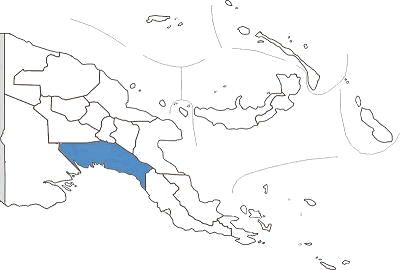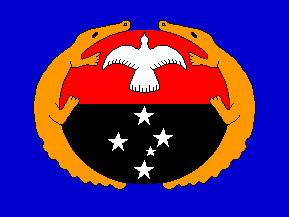Gulf Province

Gulf Province, located on the southern coast of Papua New Guinea is dominated by highland mountains, lowland river deltas and wide expanses of seasonally flooded grass plains. The Turama, the Kikori, the Purari and the Vailala are just some of the great rivers that flow into the swampy, delta-land of the Papuan Gulf.
The people of the delta-land build their houses on piles high above the muddy river banks. As the rivers change course they frequently have to move their villages. Each village is centred around the men's longhouse, known as a dobu or ravi, where weapons, important artefacts, ceremonial objects and, in the past, the skulls of enemies were stored. Men slept in the longhouse, women in smaller, individual huts outside.
Cannibalism was a way of life for the fierce Gulf people until the arrival of Christianity. Although head-hunting has not survived European civilisation, seven distinct styles of artistic craftsmanship have been categorised. A thriving market for carved masks, bull roarers, headrests, skull racks and gope boards keeps local craftsmen busy.
Gope boards are elliptical in shape and incised with brightly coloured abstract patterns. Warriors were entitled to have a gope board for each act of bravery and a board from the vanquished enemy's canoe held particular significance, transferring some of its previous owner's strength to the victor.
Delta towns Kikori and Baimuru, although set well back from the coastline, are both serviced by coastal freighters. Canoes are still an important means of transport for villagers. The provincial centre of Kerema enjoys its government status solely because it is situated to the east of the lowland delta region and is drier. The town affords most of the basic amenities and services.
Very few tourists visit the Gulf and tourism facilities are not readily available. Keen fishermen and canoeists visit the area and bushwalking expeditions have retraced the journeys of earlier explorers. Trekking to Wau through the Bulldog Road, created in the early 1900's during the gold exploration epic, is one such route. There are some guest houses available and village stays can be arranged.
The Hiri Moale Festival commemorates the traditional Motuan trade voyage from Central Province to the Gulf, in search of sago in exchange for the Motuan clay pots. This event is held every September. In November the Provincial School of Arts and Crafts holds its annual festival.
Gulf Province has about 500 kms of roads, mainly along the eastern coast and mountains. River and sea transportation is the popular mode of travel. Third level airlines also serve this part of the country.

| District | District Capital | LLG Name |
| Kerema District | Kerema | Central Kerema Rural |
| East Kerema Rural | ||
| Kaintiba Rural | ||
| Kerema Urban | ||
| Kotidanga Rural | ||
| Lakekamu-Tauri Rural | ||
| Kikori District | Kikori | Baimuru Rural |
| East Kikori Rural | ||
| Ihu Rural | ||
| West Kikori Rural |
Lavai Hotel – 648 1396
Ivandu Catholic Lodge – 648 1012
Kanabea Catholic Guest House – 648 1012
Baimuru Trading Ltd – 648 5007
Delta Lodge – 648 5029
Our advertising
rates and policy can be found through
the Online
PNG Business Directory.